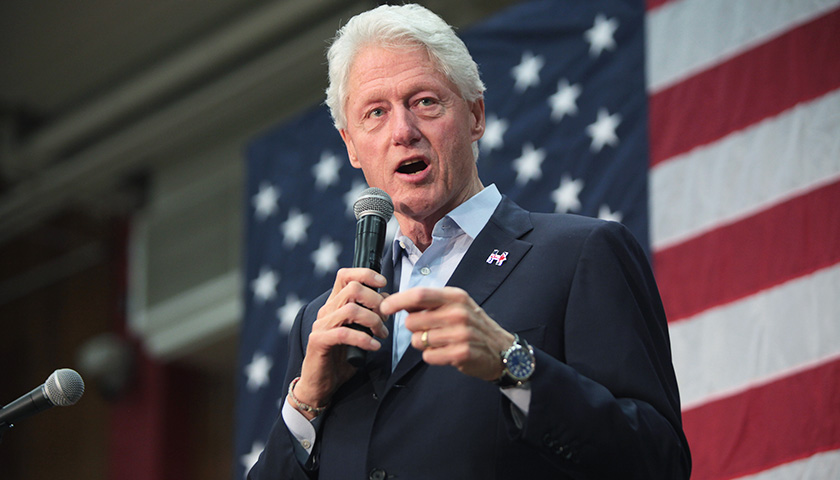by Natalia Mittelstadt
Democrats and their media allies have sought to stigmatize Republicans concerned about 2020 voting irregularities as “election deniers,” yet scores of leading Democrats have themselves raised concerns about elections won by Republicans since 2000, including claiming elections were stolen and attempting to change the outcome of presidential elections by objecting to the certification of state electoral college votes.
In the Senate race in Washington, for instance, Democratic Sen. Patty Murray’s campaign recently slammed her GOP oopnent Tiffany Smiley for her stance on election integrity, calling it “way out of line with the truth and way out of line with Washington voters.”
“Tiffany Smiley is yet another MAGA Republican who is scrambling to hide her extreme views after the primary,” Murray campaign spokesperson Naomi Savin told Axios.
Murray, however, put out a statement on Jan. 6, 2005 expressing her agreement with fellow Democrats who had “raised questions about voting irregularities” in the 2004 presidential election.
In a statement to the Washington Free Beacon, Smiley campaign spokeswoman Elisa Carlson said that Murray was “a hypocrite and has no business attacking anyone over protecting democracy.”
“She questioned the integrity of a presidential election 18 years ago, supports Democrat efforts to boost election-denying candidates, and opposes common-sense laws like voter ID requirements,” Carlson added.
Murray didn’t respond to a request for comment.
Immediately below are 10 representative examples of election denial by leading Democrats, followed by a link to a more extensive list:
- Former Secretary of State Hillary Clinton has at least questioned, if not outright denied, the outcomes of the 2000, 2004, and 2016 presidential elections, as well as the 2018 Georgia gubernatorial election. She said that the Supreme Court “took away a presidency,” following the 2000 presidential election, in its ruling in Bush v. Gore. Clinton also repeatedly claimed that Trump was “an illegitimate president.”
- Then-President Bill Clinton said regarding the 2000 presidential election, “The only way [Republicans] could win the election was to stop the voting in Florida.”
- Former President Jimmy Carter said regarding the 2000 presidential election, “There is no doubt in my mind that Al Gore was elected president.” Concerning the 2016 presidential election, he said: “I think a full investigation would show that Trump didn’t actually win the election in 2016. He lost the election, and he was put into office because the Russians interfered on his behalf.”
- Former Vice President Al Gore said of the 2000 presidential election, “I believe that if everyone in Florida who tried to vote had had his or her vote counted properly, that I would have won.”
- President Joe Biden, when he was still vice president, said regarding Gore and the 2000 presidential election, “I think he won it, anyway.” During the 2020 presidential race, in response to a supporter calling Trump “an illegitimate president,” Biden asked if she’d be his vice presidential candidate and said he “absolutely agree[d]” with her.
- When Vice President Kamala Harris was still a California senator, she said, “Let’s say this loud and clear: Without voter suppression, Stacey Abrams would be the governor of Georgia; Andrew Gillum is the governor of Florida.”
- When former President Barack Obama was an Illinois senator, he said that “not every vote was being counted” in the 2000 presidential election.
- John Kerry, now Biden’s special presidential envoy for climate, said following his defeat in the 2004 presidential election that “too many people were denied their right to vote; too many who tried to vote were intimidated.”
- Stacey Abrams, who is again running as the Democratic nominee for governor in Georgia, said she would “not concede” the 2018 gubernatorial election in her state and that she “did win my election.”
- Rep. Maxine Waters (D-Calif.), now the House Financial Services Committee chair, said in 2001 that she was objecting “to the fraudulent Florida electoral votes” in the 2000 presidential election and that she didn’t “care that [the objection] is not signed by a member of the Senate.” Gore, who was presiding over the joint session of Congress as president of the Senate, responded that “the rules do care.”
Below follows a longer (but not exhaustive) list of 82 examples of Democrat election denial:
Deniers list.pdf
– – –
Natalia graduated from Regent University with Bachelor of Arts degrees in Communication Studies and Government.
Photo “Bill Clinton” by Gage Skidmore. CC BY-SA 2.0.









Sounds like legitimate reporting—how is that possible (In this age)
Contesting the outcome of elections — claiming an election was “stolen” — is Un-American.
Un-American — IF you are a Republican, that is.
The MSM and Democrats hate it when it’s pointed out that from the Clintons on down, dozens of Democrats have routinely claimed that GOP victories were the result of fraud — that Trump and other GOP candidates didn’t really win.
This is a great compilation of the Democrats who claimed the elections were fraudulent. There’s the top ten Dem All-Stars listed, with a link to 72 other Dems making similar claims.
Every time you hear or see someone attacking Republicans who challenge election results, submit this link to remind everyone how two-faced the Democrats are:
https://thestarnewsnetwork.com/2022/09/18/the-82-democrats-who-called-gop-election-wins-questionable-illegitimate-or-stolen/
Voter fraud is only real if declared by democrats otherwise its conspiracy theory id addressed by republicans